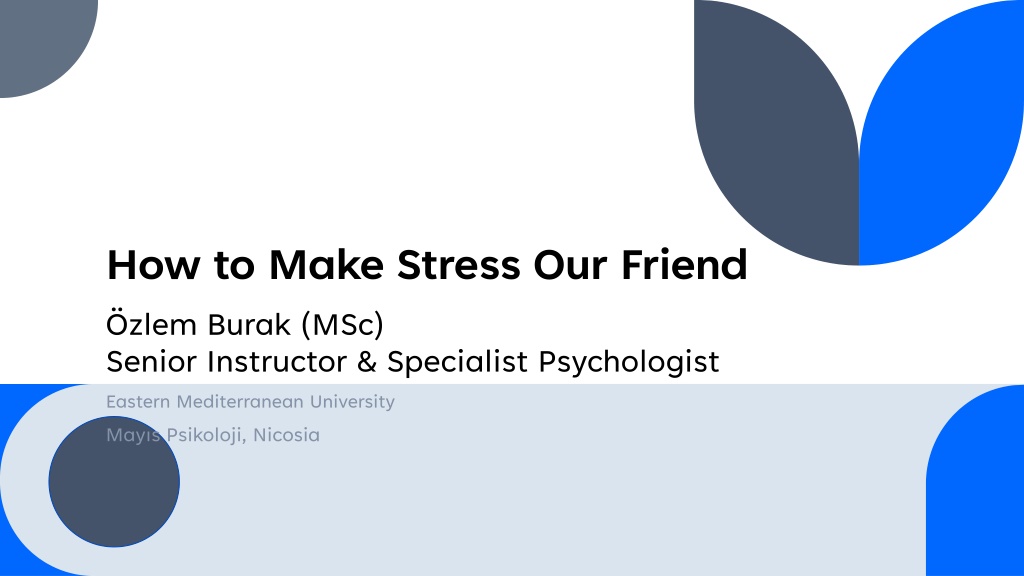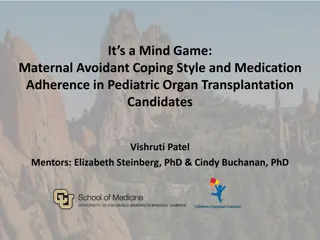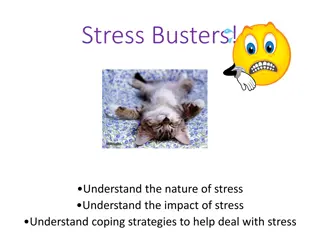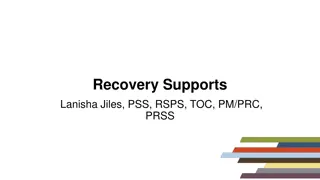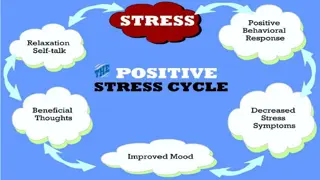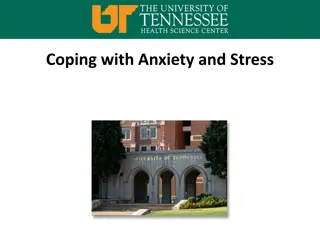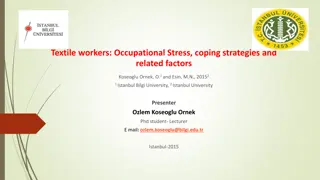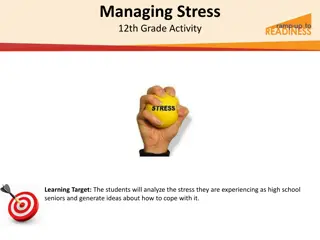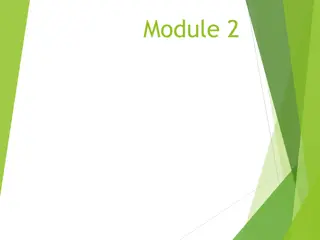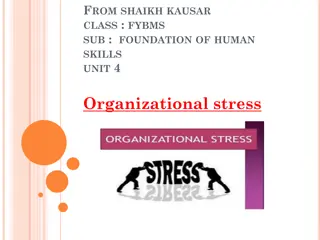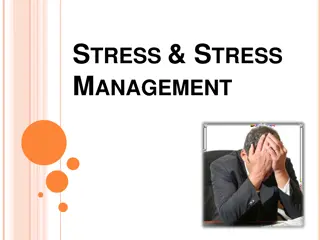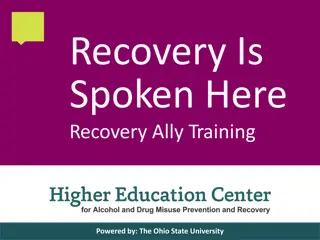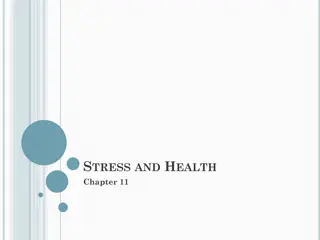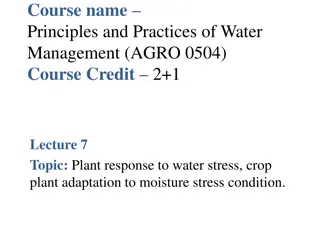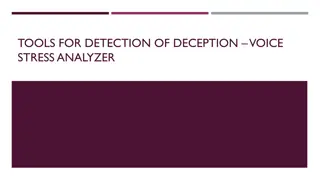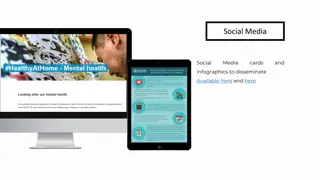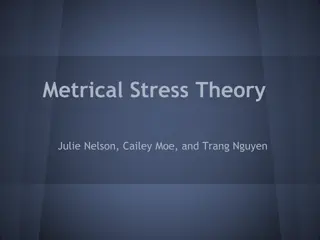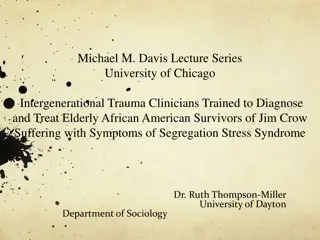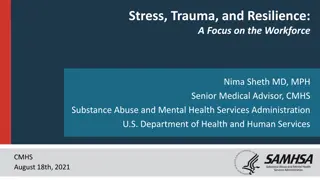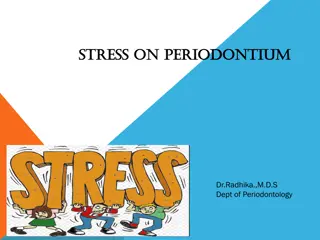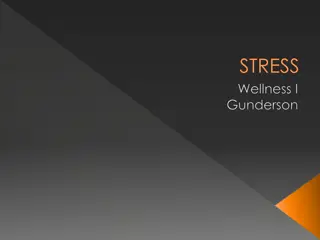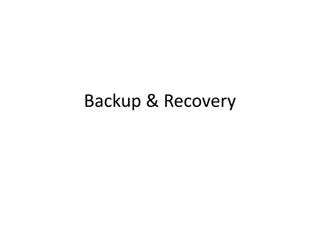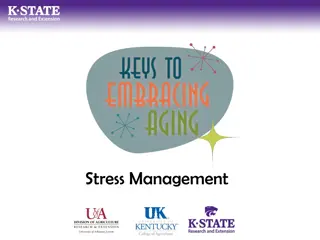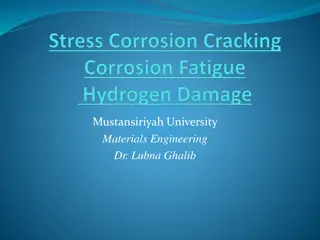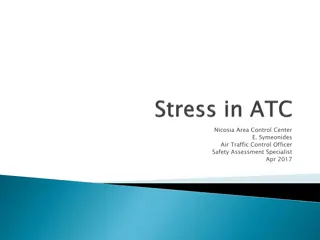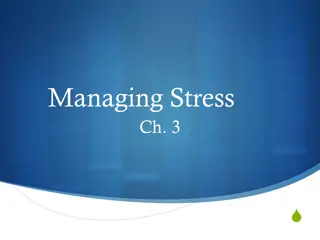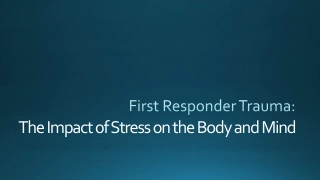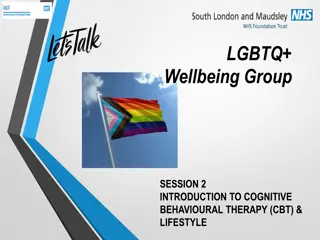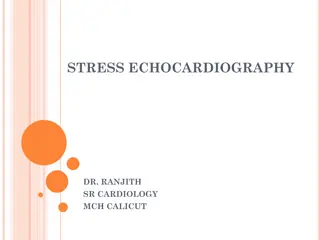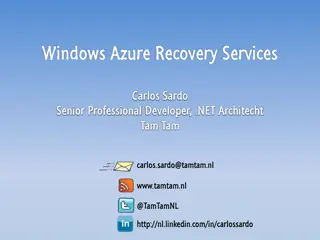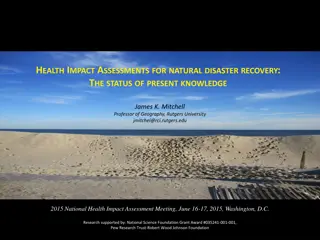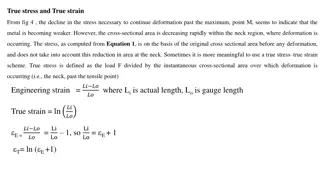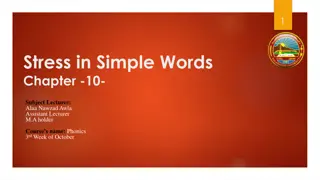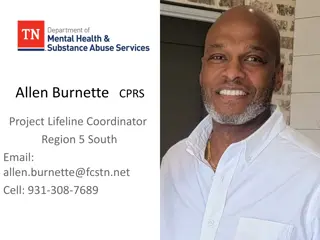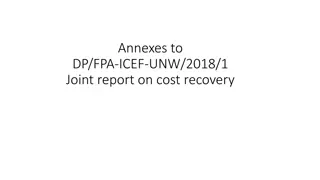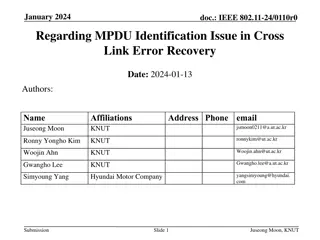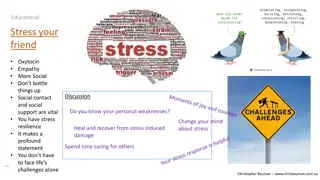Understanding Stress: Effects, Coping Mechanisms, and Recovery
Stress, a natural response to challenging events, can have both positive and negative impacts on our mental and physical health. Chronic stress can lead to various issues such as depression, anxiety disorders, and insomnia. Learning effective coping mechanisms and focusing on recovery are essential for managing stress levels and promoting overall well-being.
Download Presentation

Please find below an Image/Link to download the presentation.
The content on the website is provided AS IS for your information and personal use only. It may not be sold, licensed, or shared on other websites without obtaining consent from the author. Download presentation by click this link. If you encounter any issues during the download, it is possible that the publisher has removed the file from their server.
E N D
Presentation Transcript
How to Make Stress Our Friend zlem Burak (MSc) Senior Instructor & Specialist Psychologist Eastern Mediterranean University May s Psikoloji, Nicosia
After catastrophic events such as earthquakes and pandemics, it is very normal to feel anxiety, stress, and exhaustion temporarily. However, chronic stress is NOT healthy. Now, it is time for RECOVERY and RECREATION. 26/05/2023 2
at https://www.who.int 26/05/2023 3
Content Health and Stress Definition Physiological and Psychological Effects of Stress Coping Mechanisms Positive Effects of Stress Conclusion 26/05/2023 4
Sartorius (2006) 26/05/2023 5
Stress A person s response to events that are threatening or challenging. External Internal Deaths Expectations Injuries Demands Stressors are very subjective. E.g., birthdays, loss of a loved one Illnesses Misperceptions Relationship breakdown Assumptions Being a victim of crime Fear Acute stress vs. chronic stress Retirement Anger 26/05/2023 6
Chronic Stress High cortisol levels can cause: Brain size shrinking, Lower volume in the prefrontal cortex, Difficulty in processing emotions, Difficulties in memory caused by less flexibility in hippocampus, Negative thinking patterns including self-criticism, rumination, frequent worry, isolation, Executive functioning problems including self-control, impulsivity, adaptation, planning, Increase in depression, anxiety disorder or post-traumatic stress disorder (PTSD), Insomnia. Belleau et al., (2019), Liu et al., (2020), Tyng et al., (2017), Dioli et al., (2019), Stomby et al., (2016), Siddiqui et al., (2008) 26/05/2023 7
Stages of Stress Reaction General Adaptation Syndrome Model (GAS; Selye, 1950): 1. Alarm and Mobilisation 2. Resistance 3. Exhaustion*** ***Unhealthy coping mechanisms can cause exhaustion. 26/05/2023 8
Direct physiological effects Elevated blood pressure Decrease in immune system functioning Increased hormonal activity Psychophysiological conditions Harmful behaviours Increased smoking, alcohol use Decreased nutrition Decreased sleep Increased drug use Stress Indirect health-related behaviours Decreased compliance with medical advice Increase in delays in seeking medical advice Decrease in likelihood of seeking medical advice
Healthy Coping Mechanisms 1. Emotion-focused: People try to regulate their emotions to perceive the event as less stressful E.g., Accepting sympathy from others and looking from the bright side after loss of a loved one 2. Problem-focused: People try to solve their problems by producing new alternatives E.g., Doing more sports to reduce work anxiety level 3. Increasing Emotional Resilience 26/05/2023 10
Emotional Resilience 26/05/2023 11
Positive Effects of Stress Activating fight-and-flight response, Boosting brainpower, Short-term stress can offer an immunity-based protection, Increasing emotional resilience, Increasing motivation to succeed. Medline Plus, (2023), Yaribeygi et al., (2017), Dhabbar (2018) 26/05/2023 12
Summary Only chronic stress affects our health and wellbeing because we feel no longer in control. If you have ongoing difficulties in managing stress, talk to a mental health professional. This will help you to get the necessary psychological treatment you need (e.g., Eye Movement Desensitisation and Reprocessing, Schema Therapy, Cognitive Behavioural Therapy). There will always be stressors. To cope with them, increasing emotional resilience and understanding the positive effects of stress are vital. 26/05/2023 13
References Sartorius N. (2006). The meanings of health and its promotion. Croatian Medical Journal, 47(4), 662 664. Belleau, E. L., Treadway, M. T., & Pizzagalli, D. A. (2019). The Impact of Stress and Major Depressive Disorder on Hippocampal and Medial Prefrontal Cortex Morphology. Biological psychiatry, 85(6), 443 453. https://doi.org/10.1016/j.biopsych.2018.09.031 Liu, WZ., Zhang, WH., Zheng, ZH. et al. (2020). Identification of a prefrontal cortex-to-amygdala pathway for chronic stress-induced anxiety. Nat Commun 11, 22-21. https://doi.org/10.1038/s41467-020-15920-7 Sartorius N. (2006). The meanings of health and its promotion. Croatian Medical Journal, 47(4), 662 664. Dhabhar F. S. (2018). The short-term stress response - Mother nature's mechanism for enhancing protection and performance under conditions of threat, challenge, and opportunity. Frontiers in Neuroendocrinology, 49, 175 192. https://doi.org/10.1016/j.yfrne.2018.03.004 Medline Plus (2023). https://medlineplus.gov/ency/article/003211.htm Yaribeygi, H., Panahi, Y., Sahraei, H., Johnston, T. P., & Sahebkar, A. (2017). The impact of stress on body function: A review. EXCLI journal, 16, 1057 1072. https://doi.org/10.17179/excli2017-480 Siddiqui, S. V., Chatterjee, U., Kumar, D., Siddiqui, A., & Goyal, N. (2008). Neuropsychology of prefrontal cortex. Indian journal of psychiatry, 50(3), 202 208. https://doi.org/10.4103/0019-5545.43634 Tyng, C. M., Amin, H. U., Saad, M. N. M., & Malik, A. S. (2017). The Influences of Emotion on Learning and Memory. Frontiers in Psychology, 8, 1454. https://doi.org/10.3389/fpsyg.2017.01454 Dioli, C., Patr cio, P., Sousa, N. et al. Chronic stress triggers divergent dendritic alterations in immature neurons of the adult hippocampus, depending on their ultimate t erminal fields. Transl Psychiatry 9, 143 (2019). https://doi.org/10.1038/s41398-019-0477-7 Stomby, A., Boraxbekk, C. J., Lundquist, A., Nordin, A., Nilsson, L. G., Adolfsson, R., Nyberg, L., & Olsson, T. (2016). Higher diurnal salivary cortisol levels are related to smaller prefrontal cortex surface area in elderly men and women. European journal of endocrinology,175(2), 117 126. https://doi.org/10.1530/EJE-16-0352 Selye, H. (1950). Stress and the general adaptation syndrome. Br Med J., 4667), 1383-92. 26/05/2023 14
Thank you zlem Burak ozlem.burak@emu.edu.tr
